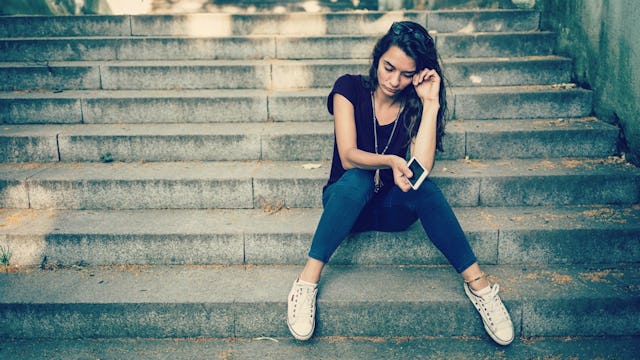Teens Are Suffering From Anxiety At Increasing Rates, And We Need To Pay Attention

It might seem silly to some parents when we hear our kids say they are stressed or anxious. We may wonder how they could possibly know what stress feels like since they’ve never experienced the pressures of raising a family, keeping a home, and having a full-time job. We may brush it off as no big deal. We may even laugh at them because they have everything they could ever want and way more than we ever had, so how could they possibly feel stress? I know I’ve been guilty.
But I’ve since changed my tune. I realized we need to take these claims from our kids seriously. We must listen to our kids when they tell us they are stressed or anxious. Whether it’s over a test or a friendship, their feelings are valid, and in some cases, they can be paralyzing and cause them to become depressed and isolate themselves and can even lead to risky, dangerous behaviors. We don’t want to be overprotective and coddle them. We want to give them tools to deal with these feelings, but how do we do help them balance it all without making their loads too heavy to carry?
The New York Times recently published an article looking deep into this epidemic among our teens. It is something that needs to be taken quite seriously, as the article reports that ignoring their (often subtle) cries for help can leave our teens repressing their feelings and ultimately takes a toll on their well-being.
The fact is, thoughts of suicide among teens have doubled in the past decade. Doubled. We have to pay attention.
As a mother to a teenage boy, I don’t have all the answers, but what I do know is his anxiety is real — even on the days when he says or acts like he doesn’t care. I know my child and his body language tell a different story. And as his mother, I want to help, but I want to do it in the right way. I don’t want to hinder his growth and self-confidence by doing too much for him or hovering too closely, but anxiety shouldn’t be taken lightly.
Because my son was suffering and having trouble expressing his anxious feelings, they were coming out as anger. So we recently signed him up for cognitive behavioral therapy, and his therapist has given him great tools such as breathing techniques and reminding him the importance of eating regularly to maintain his moods, and it has helped tremendously. But there is still more work to do. It’s a long process.
A survey done by the Association for University and College Counseling Center Directors proves anxiety is becoming more prevalent in our teens and has been on the rise since 2009. Anxiety affects many children and teens, but can easily be dismissed because its symptoms can, in some ways, pertain to everyone.
Suniya Luthar, a professor of psychology at Arizona State University, told the New York Times that anxiety affects kids in affluent areas and economically disadvantaged communities alike and notes that the kids in prosperous areas are “incredibly anxious and perfectionistic” while kids in economically disadvantaged communities have been know to act out and come off as aggressive.
There are several factors that contribute to kids’ anxiety. Feelings of never being “done,” and thinking they can always be better and should take that extra class or participate in just one more extracurricular activity were among the top reasons, according to the New York Times article.
On top of that, they worry (just as much as adults do) about their safety when they are in public places. Sometimes just going to the movies or concerts can cause them tremendous stress, and for good reason. As a country, we have seen and experienced the horror that can happen in these places. Is it any wonder our teenagers are nervous?
But the article reports the biggest source of anxiety these days is social media. This likely isn’t a surprise to you.
It’s causing our kids to question their self-worth, to compare and contrast their life and their successes to that of their peers. They worry they aren’t measuring up to their friends. They constantly feel like they are being watched and judged.
So while we may think our kids’ anxiety or stress is nothing compared to what we deal with, we need to check ourselves. It truly is a different time for our kids than it was for us. They are worried about their future. Pile on some overwhelming fear about going out in public when they are supposed to be having fun with friends, and putting their every move on social media while constantly wondering if they are enough, and we have the perfect recipe for stress.
The question we need to ask ourselves as parents is when do we back off and let our kids advocate for themselves, and when do we try to carry some of their burdens for them? When do we seek outside help and resources? It’s not an easy one to answer, and you know your child best.
What I’ve learned, through my journey with a very anxious teen, is that there is help out there, and learning to ask for it as a teen is just as hard as it is for adults sometimes. As parents, we have to pay attention: Look for red flags, talk to our kids openly and honestly, and seek help when we feel like they need it. Anxiety, stress, and depression manifest themselves differently in each individual, so there’s no clearcut path here, but there is help and support out there. Trust your gut, and trust your child.